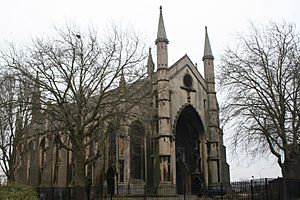Holy Trinity Church, Bordesley facts for kids
Quick facts for kids Holy Trinity Church, Bordesley |
|
|---|---|

Holy Trinity Church, Bordesley
|
|
| 52°28′14″N 1°52′39″W / 52.4705°N 1.8776°W | |
| OS grid reference | SP 08413 85848 |
| Location | Birmingham |
| Country | England |
| Denomination | Church of England |
| Architecture | |
| Architect(s) | Francis Goodwin |
| Groundbreaking | 1820 |
| Completed | 1822 |
| Construction cost | £14,235 |
| Closed | 1971 |
| Specifications | |
| Capacity | 1821 persons |
| Length | 135.5 feet (41.3 m) |
| Width | 75.8 feet (23.1 m) |
| Height | 45 feet (14 m) |
| Spire height | 83.6 feet (25.5 m) |
| Administration | |
| Diocese | Anglican Diocese of Birmingham |
Holy Trinity Church, Bordesley, is a historic building in Birmingham, England. It used to be a Church of England parish church. Today, it is recognized as a Grade II listed building, which means it's important and protected.
Contents
Building a Historic Church
Holy Trinity Church was built a long time ago, between 1820 and 1822. The architect, Francis Goodwin, designed it in the Gothic Revival style. This style looks like the grand churches from the Middle Ages.
The church cost about £14,235 to build. This money was collected from local people and also came from a special grant from the government. The church was officially opened on January 23, 1823. It was said to be inspired by the famous King's College Chapel, Cambridge.
Inside and Out: Church Design
The church has a rectangular shape with a slightly curved end. It was built using Bath stone. Outside, you can see tall, pointed supports called buttresses. These divide the windows and have decorative tops called pinnacles.
The main entrance has a large arch with a detailed design. The windows are large and have patterns made of cast iron. Inside, the church once had beautiful decorations and galleries, which are like balconies for seating.
A Church with a Story
Holy Trinity Church was important for a movement in the Anglican Church called the High Church movement. This movement focused on more traditional ways of worship.
Disagreements Over Worship Styles
One of the church's vicars, Rev Dr Joseph Oldknow, was known for his "Ritualist" practices. This meant he used more ceremonies and symbols in services than was common at the time.
Later, in 1874, Richard William Enraght became the vicar. He continued these practices, which included using candles, incense, and special communion wafers. He also wore specific robes like a chasuble and alb. These practices were not liked by everyone.
In 1880, there was a big disagreement known as the "Bordesley Wafer Case." People who disagreed with Enraght's style of worship took legal action against him. He was disciplined for his practices, which caused a lot of discussion across the country.
A New Vicar and Community Reaction
After these events, Enraght's permission to be a vicar was removed. In 1883, Rev Alan H Watts was appointed as the new vicar. However, many people in the church community were unhappy about this.
When Mr. Watts tried to lead his first service, there was a lot of noise and protest from the crowd. Even with police present, it was hard to hear him. The community showed their strong feelings about the change.
The Church's Later Years
The church's burial ground was closed in 1873, though some family graves were used until 1925. Some graves were moved when roads were widened.
An interesting fact is that in 1875, a group of cricketers from the church formed a football team. This team later became the famous Birmingham City F.C.
The church officially closed in 1971. For some years, it was used as a shelter for homeless people. It is currently empty, but there have been ideas to turn it into homes.
People Who Led the Church
Here are some of the vicars who served at Holy Trinity Church:
- Samuel Crane, 1823–41
- Joseph Oldknow, 1841–74
- Richard William Enraght, 1874–83
- Alan Hunter Watts, 1883–87
- Henry Sutton, 1887-95
- Frank Hay Gillingham, 1910–14 (who was also a county cricketer for Essex)
- Henry Raveley Guest MC, 1951–61
The Church Organ
The church had an organ built by Banfield in 1847. It was changed several times over the years. The organ was later removed from the church.
Organists of Holy Trinity
- Henry Simms 1825 – 1872
- Dr William Thomas Belcher 1884 – 1905 (he was also an organist at St Mary's Church, Handsworth)
 | Stephanie Wilson |
 | Charles Bolden |
 | Ronald McNair |
 | Frederick D. Gregory |

